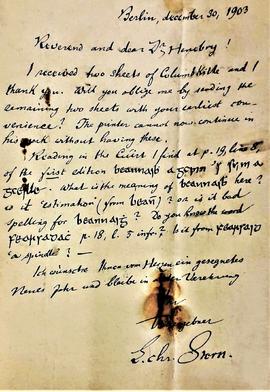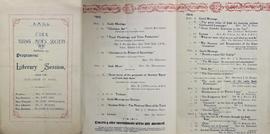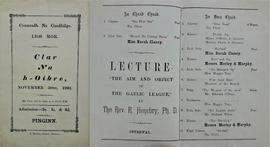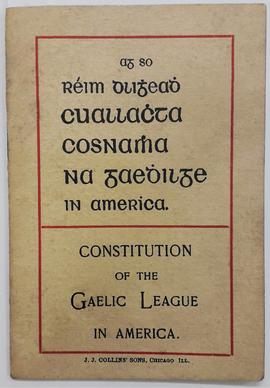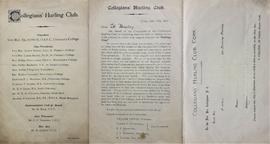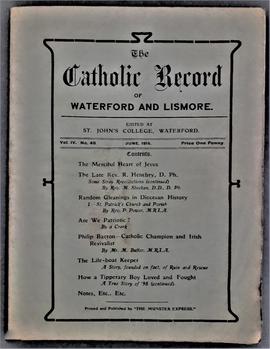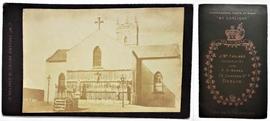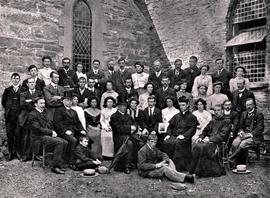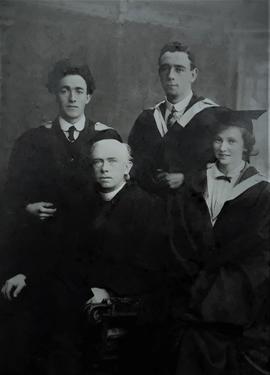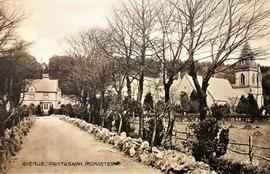Identity area
Reference code
Title
Date(s)
- 1876-1950 (Creation)
Level of description
Extent and medium
51 files; Bound volume, manuscript, typescript, photographic print, newspaper clipping, and printed
Context area
Name of creator
Biographical history
Richard Henebry (Risteard de Hindeberg) was born on 18 September 1863 in Portlaw, County Waterford, the fourth of six children of Pierce Henebry, a farmer, and Ellen Henebry (née Cashen) of Clogheen in County Tipperary. At the age of twenty-one, Richard Henebry entered St. John’s College in Waterford to study for the priesthood, where Canon Patrick Power (1862-1951) was among his contemporaries. He subsequently won a scholarship to finish his studies in St. Patrick’s College, Maynooth. He graduated from All Hallows College in Dublin in 1892. Henebry briefly served on the English mission before he was offered the inaugural Chair of Celtic Studies at the Catholic University in Washington in 1895. The Ancient Order of Hibernians, an Irish American Catholic organization, had funded the chair and Henebry was proposed by classmates Canon Patrick Augustine Sheehan and Fr. Michael Hickey for the appointment. To fully prepare for his role Henebry was given special leave to go to Germany to study, again with effective lobbying on his behalf by Hickey and Sheehan. He studied for his doctoral degree in Celtic philology in Freiburg and Greifswald with the acclaimed celticists Rudolf Thurneysen and Heinrich Zimmer.
Henebry took up his appointment at the Catholic University in Washington in 1898 only to be relieved of his duties within two years. Though he was suffering from ill-health, Henebry had also seemingly fallen out with his colleagues and superiors in Washington. A diagnosis of tuberculosis forced him to spend a year recuperating in a sanatorium in Denver, Colorado. While in America, he edited and translated a large part of the life of Colum Cille by Manus Ó Donnell which he published in ‘Zeitschrift für celtische Philologie’ (1901-05). Following his return to Ireland, Henebry taught Irish in a variety of places in the Waterford area, notably during the summers from 1906 at Ring College (Coláiste na Rinne), which he had helped establish in 1905. Various diocesan appointments followed within Waterford and Lismore, before he put his name forward for the Chair of Irish Language and Literature at University College Cork (UCC) in 1909, again an inaugural position.
Henebry remained at UCC until his death in 1916, but it was not a wholly successful appointment. His efforts to embed his model of Irish language teaching in the university were met with resistance, from students and others. His efforts to establish an archive of Irish traditional music were also thwarted, and his continuing ill-health compromised his own ability to achieve these objectives. During his lifetime, Henebry was recognized as a leading linguist, and his works on the Déise dialect of Irish were widely acclaimed in academic circles. Pedagogically (and perhaps culturally) an enduring part of his legacy was his role as a teacher at, and supporter of, Coláiste na Rinne, in the Waterford Gaeltacht. In addition to his language instruction, Henebry also taught Irish traditional music to any students who were interested. He also relished his role as a contributor to various papers and periodicals, however the longest of his musical works published during his lifetime was a booklet, ‘Irish Music: Being an Examination of the Matter of Scales, Modes and Keys with Practical Instructions and Examples for Players’ (1903). Henebry died on 17 March 1916 in Portlaw, County Waterford, and was buried in Carrickbeg near Carrick-on-Suir. Henebry’s analytical monograph, ‘A Handbook of Irish Music’ (1928), published by University College Cork, appeared posthumously, and was edited by Professor Tadhg Ó Donnchadha (1874-1949), his successor in the Department of Irish in UCC.
Repository
Archival history
Immediate source of acquisition or transfer
Content and structure area
Scope and content
The material relates to Fr. Richard Henebry’s career as a prominent Irish language academic and to the activities of Conradh na Gaeilge (Gaelic League) and general Irish language activism especially in Henebry’s native Waterford. His correspondence includes letters from leading contemporary Irish language scholars, linguists and celticists such as Whitley Stokes, Pádraig Ó Siochfhradha (‘An Seabhac’), John Strachan, Heinrich Zimmer, Kuno Meyer, Eleanor Hull, and Tadhg Ó Donnchadha (‘Torna’). The collection includes letters to Henebry from Roger Casement and Douglas Hyde.
The collection also includes material relating to the posthumous publication of Henebry’s ‘A Handbook of Irish Music’, edited by Tadhg Ó Donnchadha, and published by University College Cork in 1928. Fr. Senan Moynihan OFM Cap. was interested in Henebry’s career and was involved in the posthumous promotion of his contribution to Irish language scholarship and traditional Irish music. The files include letters from several leading academic, cultural and political figures including Sir Bertram Windle, Carl Gilbert Hardebeck, Fr. Michael Sheehan, William Frederick Paul Stockley, Mac Giolla Bhríde (William Gibson, 2nd Baron Ashbourne), and Frank Ryan. Father Senan seemingly acquired most of this material for several articles on Henebry published in ‘The Father Mathew Record’. The material was later preserved among Moynihan’s personal collection of papers.
Appraisal, destruction and scheduling
Accruals
System of arrangement
Conditions of access and use area
Conditions governing access
Conditions governing reproduction
Language of material
- English
- German
- Irish
- Italian
- Latin
Script of material
Language and script notes
Physical characteristics and technical requirements
Finding aids
Allied materials area
Existence and location of originals
Existence and location of copies
Related units of description
A number of rare wax cylinder recordings of traditional Irish music made by Fr. Richard Henebry in County Waterford are now held in the Special Collections section of University College Cork Library. See http://epu.ucc.ie/henebry/

